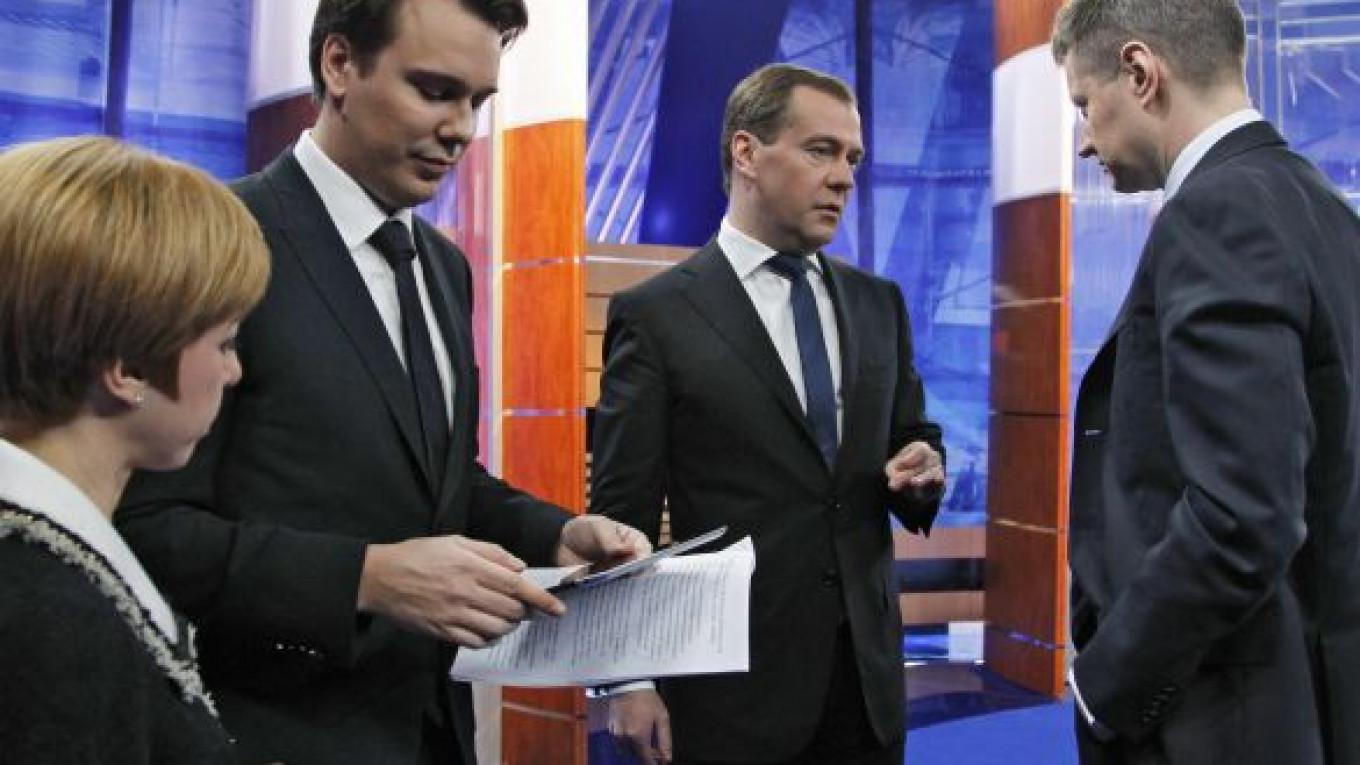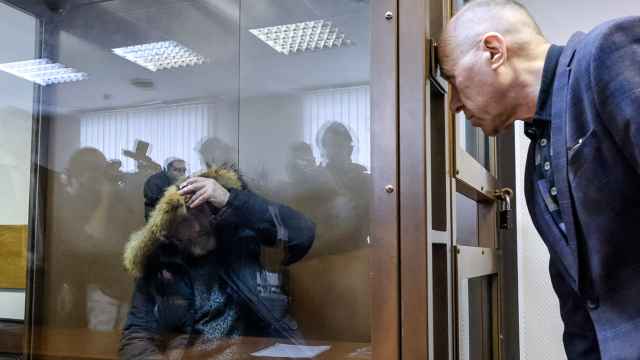In a live television interview, Prime Minister Dmitry Medvedev expressed support for a range of legislation that critics say is part of a crackdown on the political opposition, including a law requiring certain NGOs to register as foreign agents.
But the former president also conveyed liberal positions on several issues, including disagreement with a proposed national anti-gay law, maintaining his image as a less conservative politician than many in his United Russia party.
In the question-and-answer session with five TV journalists Friday, Medvedev addressed hot-button issues ranging from pension reform to violence against journalists, amid renewed speculation that he could soon be removed by President Vladimir Putin from his post as head of the government.
Medvedev also became the most prominent official to publicly state that a string of recent fraud scandals, including a case at a defense agency that led to the ouster of Defense Minister Anatoly Serdyukov, are part of a campaign to rid Russia of corruption.
"What has happened is not an accident. It is the beginning of hard work to eradicate corruption in the country," he said.
The pre-scheduled hour-and-a-half interview, aired Friday at noon on multiple national TV channels, was conducted by five prominent television journalists: Sergei Brilyov from state-run Rossia-1, Irada Zeinalova from state-run Channel One, Mariana Maximovskaya from Ren-TV, Alexei Pivovarov from NTV, and Mikhail Zygar from the opposition channel Dozhd.
In the interview, Medvedev largely defended a range of laws drafted by members of United Russia, the party he leads, that have been slammed by human rights organizations and Western politicians.
He even defended his party's move to criminalize slander, which was decriminalized in December 2011, while he was president. Medvedev said that under the new law the offense is still not punishable by jail time.
The prime minister also spoke favorably about a law that obliges nongovernmental organizations that conduct political activity and receive foreign funding to register as foreign agents.
"We're only looking for ways to regulate this activity," he said. "To immediately suspect that the authorities did this to prevent certain actions or just to add pressure on certain NGOs is at a minimum inaccurate, because nothing like that has happened yet."
He also downplayed the derogatory connotations of the term "foreign agent," which Pivovarov said sounds like "spy" in Russian.
"In our legislation, the terms 'agent' and 'agency' are absolutely common usage, and it does not mean 'spy,'" Medvedev said.
When Zygar said the law would affect prominent organizations whose leaders were members of the Kremlin human rights council during Medvedev's stint as president, including Moscow Helsinki Group head Lyudmila Alexeyeva and local Transparency International office head Yelena Panfilova, the prime minister said he respected them and called their actions "useful for the country."
Near the end of the interview, Zygar asked a surprise question about proposed legislation banning so-called "gay propaganda" among minors, which is based on laws already on the books in St. Petersburg and several other Russian cities.
Medvedev responded by saying that "not all kinds of human behavior should be regulated by laws." His oblique language was apparently aimed at deflecting a backlash from supporters of the bill, whose ranks include prominent members of his own party.
Zygar said the question had been sent via Twitter by an openly gay person who worked in the United Russia press service.
Medvedev was once favored by members of the urban middle class, who supported his liberal agenda, but he has lost public support since September 2011, when he opted not to seek a second term as president, saying Putin should run instead.
According to the Levada Center, Medvedev's approval rating stood at 54 percent in November, down from 64 percent in May, when he switched jobs with Putin. His rating was above 70 percent for most of the first three years of his presidency.
Putin's approval rating stood at 63 percent in November, his lowest since December 2011.
In Friday's interview, Medvedev once again defended his decision to support Putin's re-election bid, calling it "right for that period of time."
But Medvedev said he does not exclude the possibility of seeking the presidential post again in 2018.
"I am not an old politician yet," he said.
Speculation that Medvedev will not last long as prime minister was renewed Friday by a report in Izvestia that said he could be replaced by powerful Deputy Prime Minister Dmitry Rogozin as soon as March.
The report, which cited analysis by the left-leaning Institute of Globalization Issues, said the shake-up could take place as the result of a clan war among the political elites.
Observers have long speculated that Medvedev's declining political clout could cause him to be ousted from his post as prime minister.
Friday's TV interview was the second in such a format that Medvedev had given this year. The first came in April, his last full month as president.
Among the other questions he answered was one from Zygar about the 2010 beating of former Kommersant journalist Oleg Kashin. Medvedev said that the investigation was ongoing and that he could not reveal any details of it because they are confidential.
Kashin, now a freelance journalist, called Medvedev's words regarding the investigation "strange," adding that the prime minister had avoided the part of Zygar's question regarding the alleged involvement in the case of Vasily Yakemenko, founder of pro-Kremlin youth group Nashi.
"As I understand, the case is not being investigated. I hope Dmitry Medvedev will at least feel uncomfortable," Kashin said in comments carried by Kommersant.
Kashin has said he suspected members of Nashi of being involved in the attack against him, an allegation Yakemenko has denied.
No question was asked regarding the Magnitsky Act, the U.S. bill passed Thursday by the U.S. Senate that would punish Russian human rights violators, including those implicated in the death of Hermitage Capital lawyer Sergei Magnitsky.
Medvedev appeared laid-back in the interview, his answers frequently taking the form of back-and-forth exchanges with the journalists.
He chatted with the reporters on subjects including his cat Dorofei and the price of his watch, which he said cost £80 ($130) — much less than the pricey watches Putin has been photographed wearing.
"It shows the time, and that's it," Medvedev said.
Related articles:
A Message from The Moscow Times:
Dear readers,
We are facing unprecedented challenges. Russia's Prosecutor General's Office has designated The Moscow Times as an "undesirable" organization, criminalizing our work and putting our staff at risk of prosecution. This follows our earlier unjust labeling as a "foreign agent."
These actions are direct attempts to silence independent journalism in Russia. The authorities claim our work "discredits the decisions of the Russian leadership." We see things differently: we strive to provide accurate, unbiased reporting on Russia.
We, the journalists of The Moscow Times, refuse to be silenced. But to continue our work, we need your help.
Your support, no matter how small, makes a world of difference. If you can, please support us monthly starting from just $2. It's quick to set up, and every contribution makes a significant impact.
By supporting The Moscow Times, you're defending open, independent journalism in the face of repression. Thank you for standing with us.
Remind me later.






